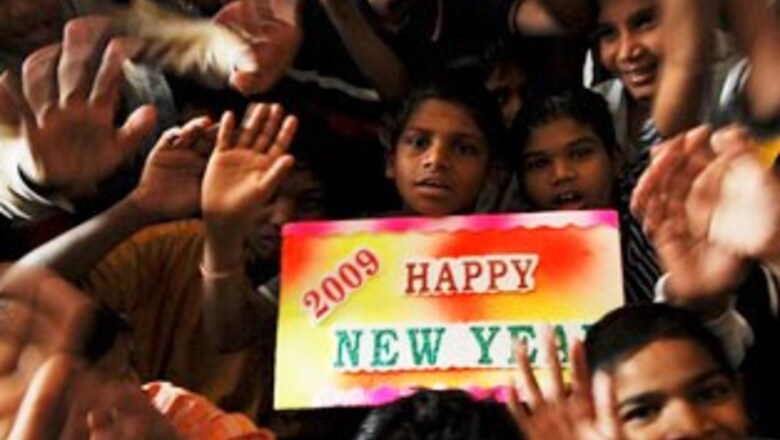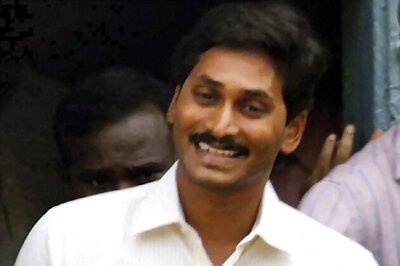
views
Year 2008 was rough. It was a year where past excesses and lack of foresight led to perhaps the greatest recession in history; a year of reorganisation of world powers; and a year that ended in terrorist attacks on India that called into question the effectiveness and adequacy of our government, media, police and intelligence forces. The question stands--did we do anything right?
A fiscal cushion
The lack of foresight across the board--among economics experts down to the common man—is perhaps one of the most startling aspects of the global financial crisis. But taking a closer look at the Indian economy and the fiscal policies of the past year, it seems not everything was done in error or without prescience.
Ajit Ranade, Chief Economist with the Aditya Birla group, says the expansionary budget unveiled by then Finance Minister P. Chidambaram in February was a measure that helped stave off some of the crisis.
When Chidambaram announced the budget, it was called ‘populist’ and the BJP said it was a ‘recipe for long term economic disaster’. The budget increased expenditure targets on rural development and education, cancelled loans made to farmers, and offered tax relief to low-income groups.
But Ranade says the criticisms were off-target. “The expansionary fiscal spending had impact on rural purchasing power. No one anticipated what was coming, but in hindsight this looks like it helped us with the slowdown,” he says.
Chidambaram’s budget increased banks’ target loan disbursals to the agricultural sector by Rs. 2.8 trillion ($70.52 billion), and Rs. 160 billion were allocated for employment in rural areas. The health sector allowance increased by 15 percent to Rs. 165.34 billion.
The budget also raised taxes on short-term investments and brought the mutual fund industry under the tax service net. At the time, this hurt market sentiment.
However, looking back, the budget provided a fiscal cushion, says Ranade. “While there was a slowdown in global markets, domestic markets kept up some momentum. We have seen our second quarter GDP show 7.6 percent growth, which was higher than expected. The budget might have mitigated some of the effects and allowed for this growth.”
The realty bubble predicted
While much of the world seems caught by surprise by the popping of the real estate bubble, Ranade says the monetary policy and stance of the RBI proved to be in the right direction in terms of the real estate market.
PAGE_BREAK
In December 2007, RBI Deputy Governor, Rakesh Mohan, warned against the real estate bubble in his address at Yale University on India’s financial sector reforms. Mohan said that the elevated realty prices along with non-transparency in the real estate sector might lead to an “asset bubble” and pose risks to the banking system.
He also said that the backlog in housing, growing income, and more urbanisation meant a continued demand for housing and pressure on real estate prices over the next year. “Such developments can easily generate bubbles in the real estate market because of problems in the elasticity of supply and information asymmetries,” he warned.
Mohan didn’t just talk; the RBI did something about it.
Ranade says that the RBI started tightening their policies much earlier than other parts of the world. “The RBI warned against the real estate bubble two years by starting to increase the risk rate on commercial real estate loans. They also put a cap on excessive lending to real estate.”
The policies of the RBI may have also prevented the subprime crisis in India, says Ranade, which is a minimal category in this country compared to the US.
Shift towards a multi-polar world
At a time when the global community is critical of US’ excesses in Wall Street and there is talk of the dollar ceasing to be the dominant world currency, a radical reorganising of world power seems more likely.
This unexpected result of the meltdown may be something else 2008 did right. The G-20 summit in Washington in November to discuss the global financial crisis put India and China centre stage and gave the BRIC countries more of a say as the world powers recognised the need for a global coordinated response to the crisis. The multi-polar world America has dreaded since the end of the Cold War (Vice President Dick Cheney and former Deputy Defense Secretary Paul Wolfowitz have repeatedly sworn to prevent it at all costs) seems to be in the not-too-distant future.
The United States National Intelligence Community survey of the world of 2025 in its report, “Global Trends 2025: A Transformed World”, confirms this. The survey found that the US was losing dominance, and China and India were lining up to fill its shoes.
In addition to the G-20 summit and other achievements such as the nuclear deal, India has proved itself in 2008 by breaking records. In April India sent 10 satellites into orbit in a single launch, setting the new world record. And at the Olympics in Beijing it received its first gold medal.
PAGE_BREAK
With the collapse of established financial systems and the approaching departure of President Bush, records may not be India’s primary expression of clout. As the inflexibility and egotism of larger countries like the US tempers, India’s global role may continue to expand rapidly as it did at the G-20.
Yes, we can
The election of Barack Obama may be crucial to the way world powers reorganise themselves. Countries the world over are not unhappy about it. In an Economist magazine survey of an imaginary global electoral ballot, Obama got the world vote 9115 to 203.
While President Bush may have been more pro-India than any president in US history, most notably with the passage of the nuclear deal and his policies on outsourcing, Obama may prove just as favourable. While there were initial concerns about his views on outsourcing and his promise to intervene in Jammu and Kashmir, he has since toned down those pledges.
Shanthie Mariet D’Souza, Associate Fellow at the Institute of Defense Studies and Analyses, New Delhi, acknowledges that there have been problem areas, but says that with Hillary Clinton as Secretary of State, there will be better understanding of these issues.
D’Souza also thinks there will not be a drastic change from the previous administration. “We feel that the new Obama administration will understand the strategic issue in South Asia well because Obama is interested in balance of power. He talks of change from a unilateral policy to a multilateral one, including the stand on Iran and negotiation in Afghanistan, and we think he will work to achieve that.”
Obama’s foreign policy advisor, Wendy Sherman, has stressed the future president’s plans for an overhaul in the interface between the US and the rest of the world. “He is going to engage with the world…with smart diplomacy, strong alliances and really bring America’s moral authority back into the world,” she says.
D’Souza says that despite Bush’s pro-India policies, the Obama administration is a welcome change because of a badly-managed Bush administration. “Because Obama is open to different opinions, with intellectual curiosity to absorb different things, we think he can make real change. It’s both his team and vision he has.”
2009 will show whether Obama’s policies will be beneficial to India, and whether his pledges are bonafide. But judging the overwhelming global consensus in his favour, Obama’s victory may prove to be something America did right this year.
A mature reaction to cross-border terror
More than the election of a new American president, or the reports from intelligence agencies indicating a reorganization of global power, the recent terrorist attacks on Mumbai have shaken up the world. The attacks, which battered Indian nationals and Western visitors, have forced the West to take more than a cursory look at India.
Visits by Condoleeza Rice, and officials from the CIA, FBI and NYPD in response to the attacks illustrate the US’ understanding that a closer relationship with Pakistan than India may need to change.
But what has the Indian government done right in light of these attacks? Ashok K. Behuria, Research Fellow at the Institute for Defense Studies and Analyses in New Delhi, says the policy-makers have reacted in the best way they could.
PAGE_BREAK
While many Mumbaikars are angry about the government’s inaction thus far, Behuria says they have been right in advocating restraint. “The government is not doing nothing. They are discussing a lot of options right now: more coordination among security forces, and the possibility of a homeland security agency. Paranoia has set in, but the people at the policy making level have their heads in the right place.”
Devyani Srivastava, Research Officer at the New Delhi-based Institute of Peace and Conflict Studies (IPCS), agrees. “The diplomatic reaction of the government displays a sort of maturity. They have been able to separate the terrorism issue with other aspects of the relationship of Pakistan and India, which is difficult.”
Many would take issue with this notion, but the next few weeks will prove if the government can present a coherent, effective response to the situation.
The nuclear deal: New-found power
However the policy-makers react to the attacks, one thing they have already achieved in 2008 is the passage of the US-India nuclear deal.
The bilateral agreement for nuclear cooperation between the two countries, exchanging the separation of civil and nuclear facilities in India for full civil nuclear cooperation from the US, was a landmark accord for India after years of being ostracized for not having signed the Nuclear Non-Proliferation Treaty. The waiver by the Nuclear Supplier’s Group that followed, allowing India to access civilian nuclear technology, was crucial.
Dr. S. Chandrasekharan, Director of the South Asia Analysis Group, says, “We had hardly done 3,000 megawatts and now by 2020 we may achieve the 20,000 megawatts goal. As our economy grows at 8 or 9 percent, this added power is essential. We had the money and expertise, all we needed was the power from countries willing to give it to us, and now we have it.”
The benefits of the deal extend to newly shared facilities of commercial aircraft manufacture, ship building, factories for power plants, steel making plants, mining and drilling hardware, petroleum and petrochemical plant building facilities. The deal also means availability of the latest technology for nuclear power generation, as well as offshoot benefits for markets which are related to nuclear commerce. New business worth $100 billion for companies at home and abroad over the next decade has been estimated as a result of the deal.
Srivastava of the IPCS says the geopolitical effects of the deal have also been big. She cites the greatest benefit to be the confidence the deal generated about Indian diplomacy and its ability for negotiation.
Chandrasekharan says India has joined the international mainstream as a result of the deal. Experts say India will be less isolated, with a new voice in forums like the UN, WTO, and world monetary lending institutions. India may become a member of G-8. And there will be more frequent inter-government exchanges on matters of mutual interest.
But Chandrasekharan warns against being too optimistic. “It’s too early to say how this will change things. Nuclear power doesn’t come in a day. Of course the general economy will improve because it will sustain economic development. Now we are getting some of the energy needed but this doesn’t completely fill the need. We have to look into other sources of energy.”
The actions of the finance minister and the RBI, the G-20 summit and the election of a new American president, the response of the Indian government to terrorist attacks and the passage of an agreement for nuclear power—2008 may not have been all pandemonium and crisis. We may have done some things right, as a country, and as a world. But like the nuclear deal, it may be too early to tell.
(Elizabeth Flock is an associate reporter with the new business magazine to be launched by Network 18 in association with Forbes, USA. )




















Comments
0 comment